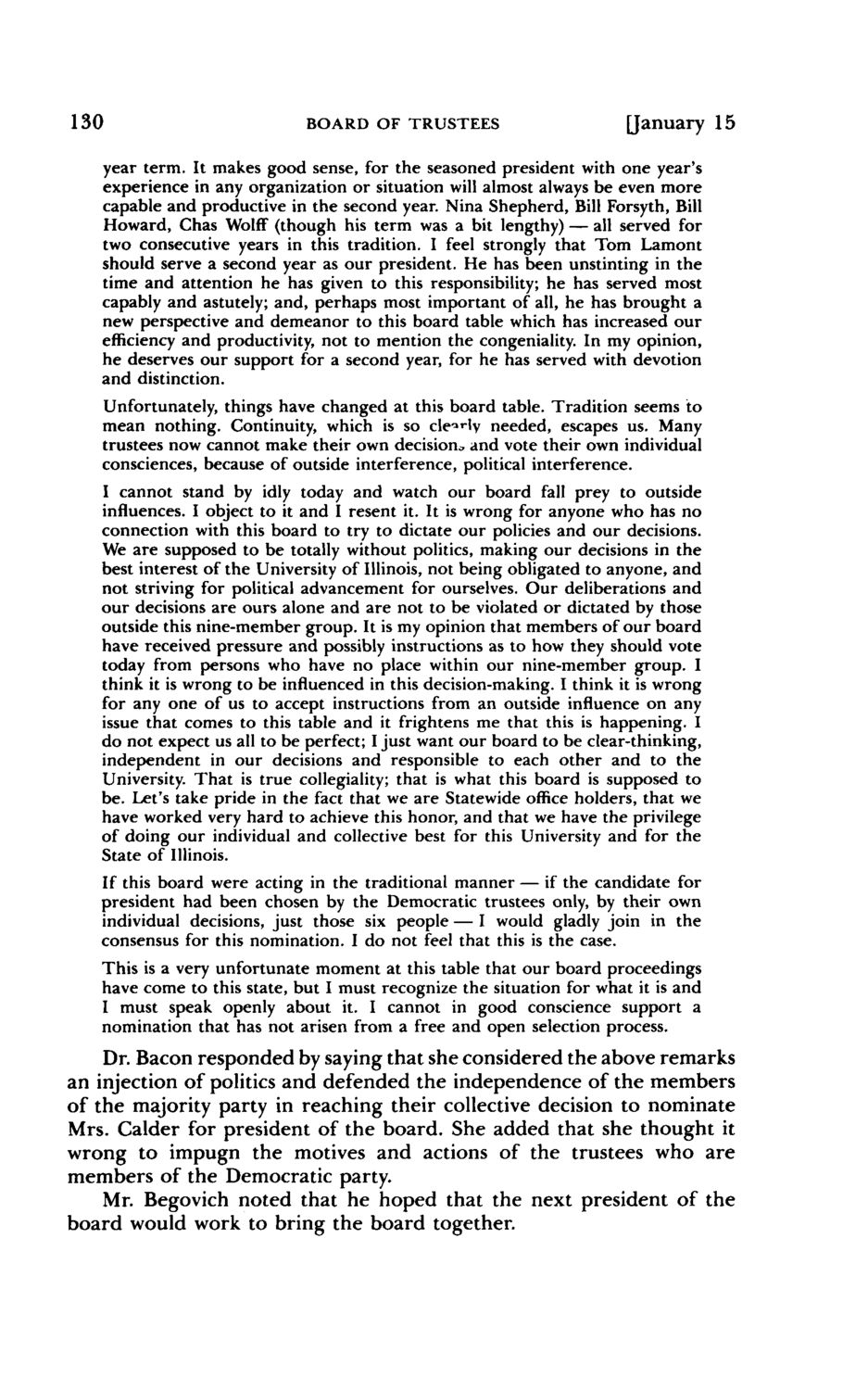| |
| |
Caption: Board of Trustees Minutes - 1992
This is a reduced-resolution page image for fast online browsing.

EXTRACTED TEXT FROM PAGE:
130 BOARD OF TRUSTEES [January 15 year term. It makes good sense, for the seasoned president with one year's experience in any organization or situation will almost always be even more capable and productive in the second year. Nina Shepherd, Bill Forsyth, Bill Howard, Chas Wolff (though his term was a bit lengthy) — all served for two consecutive years in this tradition. I feel strongly that Tom Lamont should serve a second year as our president. He has been unstinting in the time and attention he has given to this responsibility; he has served most capably and astutely; and, perhaps most important of all, he has brought a new perspective and demeanor to this board table which has increased our efficiency and productivity, not to mention the congeniality. In my opinion, he deserves our support for a second year, for he has served with devotion and distinction. Unfortunately, things have changed at this board table. Tradition seems to mean nothing. Continuity, which is so cle-*rly needed, escapes us. Many trustees now cannot make their own decision* and vote their own individual consciences, because of outside interference, political interference. I cannot stand by idly today and watch our board fall prey to outside influences. I object to it and I resent it. It is wrong for anyone who has no connection with this board to try to dictate our policies and our decisions. We are supposed to be totally without politics, making our decisions in the best interest of the University of Illinois, not being obligated to anyone, and not striving for political advancement for ourselves. Our deliberations and our decisions are ours alone and are not to be violated or dictated by those outside this nine-member group. It is my opinion that members of our board have received pressure and possibly instructions as to how they should vote today from persons who have no place within our nine-member group. I think it is wrong to be influenced in this decision-making. I think it is wrong for any one of us to accept instructions from an outside influence on any issue that comes to this table and it frightens me that this is happening. I do not expect us all to be perfect; I just want our board to be clear-thinking, independent in our decisions and responsible to each other and to the University. That is true collegiality; that is what this board is supposed to be. Let's take pride in the fact that we are Statewide office holders, that we have worked very hard to achieve this honor, and that we have the privilege of doing our individual and collective best for this University and for the State of Illinois. If this board were acting in the traditional manner — if the candidate for president had been chosen by the Democratic trustees only, by their own individual decisions, just those six people — I would gladly join in the consensus for this nomination. I do not feel that this is the case. This is a very unfortunate moment at this table that our board proceedings have come to this state, but I must recognize the situation for what it is and I must speak openly about it. I cannot in good conscience support a nomination that has not arisen from a free and open selection process. Dr. Bacon responded by saying that she considered the above remarks an injection of politics and defended the independence of the members of the majority party in reaching their collective decision to nominate Mrs. Calder for president of the board. She added that she thought it wrong to impugn the motives and actions of the trustees who are members of the Democratic party. Mr. Begovich noted that he hoped that the next president of the board would work to bring the board together.
| |